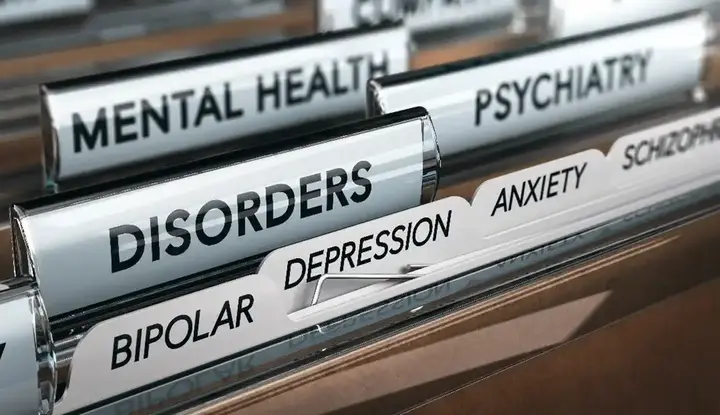Dreams: the key to knowing your mental health status

Dreams, whether what you see during your sleep or what you see while awake, which is what we call daydreaming, can be the key with which you open a door inside your inner feelings, especially repressed feelings that you could not express, and scientifically dreams are considered an activity that occurs inside your mind during sleep. Your dream can be ideas, simple images, or even a long and eventful story that sometimes makes it difficult to tell it from reality. Sometimes your dream involves body movement as well, such as dreaming that you are falling down the stairs or into a chasm and your body moves to try to avoid falling. Or dream of fighting, hand-wrangling, moving your hand on the defensive and other movements.
Recommend
Show key points
- Dreams serve as a gateway to express repressed emotions and thoughts that we may not reveal while awake.
- They typically occur during the REM stage of sleep, every 90 minutes, and usually last around 10 minutes.
- Dreams are created either by recalling daily experiences or by revealing buried desires hidden in the subconscious.
- ADVERTISEMENT
- For people suffering from mental illnesses like depression or schizophrenia, dreams can manifest as distressing nightmares that reflect their inner turmoil.
- Nightmares experienced by mentally healthy individuals can result from temporary stress or emotional disturbances.
- Persistent, disruptive nightmares that impact daily functioning may indicate a psychological disorder requiring professional help.
- Scientifically, dream interpretations vary, with Freud viewing them as expressions of the subconscious, while Calvin Hall sees them as reflections of personal perceptions and life experiences.
Seeing dreams is actually a healthy thing, as your brain stays fit instead of being lazy while sleeping. But are our dreams related to our mental health and quality? Or does an individual's mental health affect what they see from dreams? This is the topic of this article and we will explain it more clearly.
Psychiatrists see dreams as related to the psychological state of both sick and healthy people. Also, dreams that a person sees during their sleep, wakefulness, or even dreams and wishes for the future are a way of understanding what is going on in people's subconscious.
Do you know that you see more than one dream while sleeping? But you'll probably only remember the last one. Scientists conducted an experiment to find out the duration and timing of the dream during sleep and discovered that dreams occur at a certain time at REM, which occurs every 90 minutes and lasts for 10 minutes. Although some dreams seem very long to you, they actually take 10 minutes or less sometimes.
1- How does the dream happen?

Imagine that your dream is a film produced in two ways. In the first method, your brain recalls events that have passed in your day, such as disagreements, situations, encounters, or work details. Your mind can call up a topic that you have in mind to think about, especially before bed. For example, it could be a decision you need to make, a problem you're thinking about, or even a situation you've been through that you don't understand well. You can think of this method as a script that has already been written before.
The second method is deeper, involving repressed thoughts and desires that you have not expressed or hidden from the other two. These desires or ideas can be against your community's values or beliefs, and it is simply possible that you are ashamed to express them for any reason or consider them to be aspirations that exceed your abilities or talents and potential.
Dreams are often the result of those repressed desires that you could not express and suppressed. Through your sleep, you vent those desires, satisfy your feelings through dreams, and compensate for what you cannot achieve while awake.
2- Are dreams a form of mental illness?

Dreams are not a disease at all it is the breather as we mentioned that can balance your feelings but this applies to normal people. In the case of patients with mental illness, dreams represent the patient's suffering as if it were the monster that seeks to hunt and torment him at night.
For example, patients with schizophrenia or depression and anxiety have nightmares that make sleep a journey of suffering for them. Their fears are embodied in disturbing dreams that haunt them during the night. A depressed patient sees dreams that increase his discomfort and sadness and therefore, he wakes up in a bad psychological situation. As for the schizophrenic patient, he sees ghosts in his dreams and hears frightening and disturbing sounds, and it is not only his dreams during sleep, but also daydreams.
If you are a normal person but are going through bad circumstances and suffering from a disturbed psyche, such as feeling upset, anxious, upset or upset, you may have bad dreams, which we call nightmares. Nightmares are more common among children but can occur at any age. Sometimes nightmares are for very short periods such as moments, but we feel that they are long and frightening and may cause the individual to panic and fear of sleep. You will notice that most nightmares are related to the idea of safety, survival, or other disturbing events.
Your nightmares turn into a psychological disorder that needs professional intervention if it recurs many times and makes you unable to carry out their daily tasks. Also, if the nightmares are accompanied by problems with concentration, memory, constant feeling sleepy, or problems with relationships and behaviors. Turning to a specialist will help you cope with your problems that affect the quality of your sleep.
3- Interpretation of dreams scientifically

Most ancient civilizations tried to interpret dreams and quackery and sorcery played a big role in the attempts of some to interpret dreams. From a religious point of view, some saw dreams as messages from God and others saw them as the work of Satan. What interests us here is the scientific opinion of the interpretation of dreams and there are two schools of dream interpretation, one of which is the Freud school which is very much what we discussed which is that dreams are ideas and desires that already exist in the subconscious mind. The other school is for the scientist Calvin Hall, who sees dreams as thoughts that appear during sleep and are reflections of our personal lives. Thus, Calvin Hall sees your dreams as a reflection of your idea of yourself, others, your environment, or even a way to meet everyday challenges. For example, when a person dreams that he has become a strong businessman and then loses all his money, Hall believes that it means that the person is strong but fears that he will not be able to retain his power.








